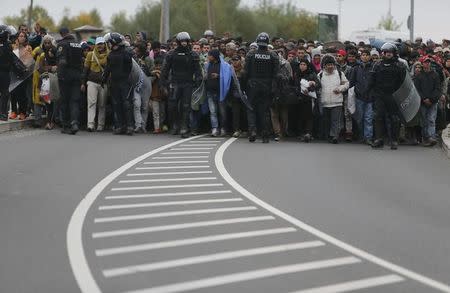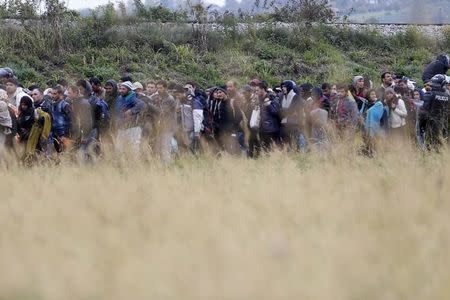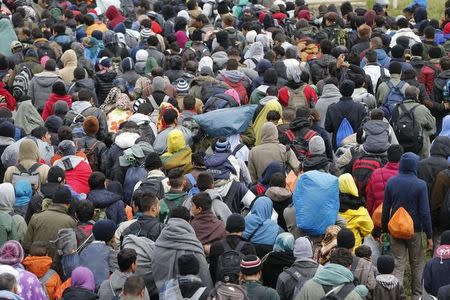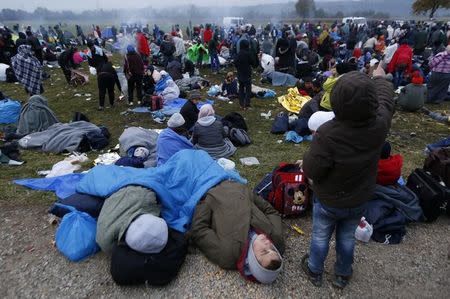Alpine oasis Slovenia shocked, overwhelmed by migrant influx
By Marja Novak LJUBLJANA (Reuters) - Tiny Slovenia has always seen itself as a serene Alpine oasis of central Europe distinct from the volatile Balkans it fringes. It needed only 10 days to win its war for independence from Yugoslavia in 1991 and is now nestled inside the euro zone. But that sense of security and achievement against all odds has been shocked by a sudden, bewildering influx of refugees from the Middle East and Asia who have trekked northwards through the Balkans bound for the affluent European Union. "Slovenia cannot stand this migrant pressure much longer, maybe just another week. I'm worried. The EU should close its outer borders," said Denis Marjanic, who works in tourism in the elegant baroque capital Ljubljana. Slovenia, the size of Canada's Lake Ontario, is only a way station for the asylum seekers, as almost all of the more than 680,000 to have reached Europe this year want new lives in wealthier western EU states like Germany. But Slovenia's resources have been overwhelmed as it has become the only conduit for migrants bent on reaching western Europe following the sealing of Hungary's borders by its rightist, anti-immigrant government. "If Austria (to the north) closes its border too we can expect up to 300,000 migrants in Slovenia and we as a small country simply cannot process that," the country's Red Cross chief Natasa Pirc Musar told national TV channel Slovenia. Austria has kept its borders open to transiting migrants as long as Germany takes them in. But a popular backlash against the ballooning numbers of asylum seekers is building in Germany. Croatia began accepting migrants coming from Serbia and channelling them into Slovenia - which like Austria is part of the EU's passport-free Schengen zone - after Hungary slammed the door. But bottlenecks have built up along new routes and border crossing points in the Balkans, and aid workers fear the humanitarian crisis will worsen as winter weather descends. Since Saturday, 50,400 migrants have entered Slovenia, a country of 2 million citizens and the smallest on the migrant transit corridor, with almost 10,000 coming on Thursday alone. Beleaguered Slovenian authorities said on Friday all options were being considered, including fencing off the boundary with Croatia, if EU leaders did not stop squabbling and agree a common, burden-sharing approach to the crisis. "WHERE IS THIS ALL GOING?" "My question is where is this all going. Slovenia can only hold on for another 14 days if such an inflow continues. It is quite possible the European Union will break up over this," said Samo, a construction employee. "I cannot understand how these people allow their children, their pregnant wives to journey such a distance and suffer like this," he said. "Saudi Arabia should help the migrants, for example, instead of building a big mosque in Bosnia." On Friday morning thousands of refugees and migrants were sitting in a field outside the small town of Rigonce near the Croatia border with temperatures near freezing. From there they were to be escorted by police to a camp for registration before continuing on their journey to Austria and likely Germany. But in Rigonce, "people cannot even get home because the roads are full of migrants and therefore practically closed," said Ivan Molan, mayor of the neighbouring city of Brezice. "I'm sorry for these people, the EU should accept them as they cannot stay in their countries. But they should not be allowed to choose where in Europe they will go," said Suad, a man selling chestnuts in Ljubljana's open market. Slovenia actually has previous experience taking in refugees. Suad was one of them - some 70,000 from Bosnia, along with 23,000 from Croatia, when those fellow ex-Yugoslav republics were fighting extended, devastating wars to obtain independence from Belgrade. Slovenia had no difficulty integrating those refugees as most had relatives or friends there. The country also has small Italian and Hungarian minorities. But Slovenes want current migrants to simply pass through as quickly as possible to larger, richer EU counterparts better able to absorb them. Slovenia joined the EU and NATO in 2004 and in 2007 became the first former communist state to adopt the euro, but was badly hit by the global financial crisis and narrowly avoided an international bailout for its banks in 2013. "The EU should do much more, the selection of migrants should be done already in Greece," retired civil servant Andreja Gale said. "I know it is hard for Syrians but it is not acceptable that other migrants are joining in this wave." The major Ljubljana daily Delo editorialised that the privations suffered by migrants en route amounted to a shameful spectacle in modern Europe and called on Slovenian authorities to set an example to larger neighbours. "By treating the refugees with humanity and not putting up barbed wire, Slovenia should prick the conscience of Europe and wider forces, showing the need to establish a large humanitarian alliance to end the tragedy in Syria," Delo said. (Writing by Mark Heinrich; Editing by Mark John)






